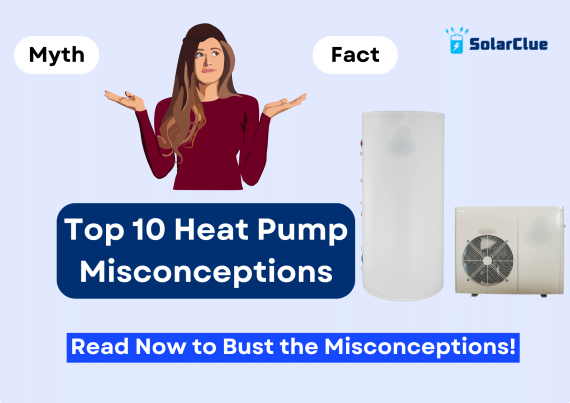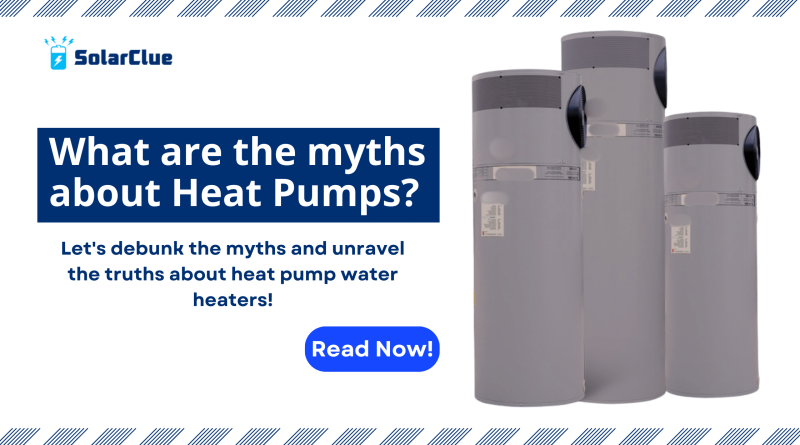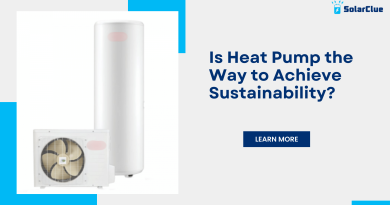Top 10 Heat Pump Myths that you all should know?
Are you considering installing a heat pump to meet your hot water needs? But you are having second thoughts because of some heat pump myths that are all over the internet.
This blog will act as a heat pump myth buster, by stating the real facts for you. Let’s get started!
Table of Contents
- 1 What is a heat pump and how it works?
- 2 What are the 10 common heat pump misconceptions?
- 2.1 Myth 1: Heat pumps don’t work in cold climates.
- 2.2 Myth 2: Heat pumps always need a backup heating system.
- 2.3 Myth 3: Heat pump water heaters are noisy.
- 2.4 Myth 4: Heat pump water heaters take a long time to heat water.
- 2.5 Myth 5: Heat pump water heaters are expensive.
- 2.6 Myth 6: Heat pumps require a lot of space.
- 2.7 Myth 7: Heat pumps are not environmentally friendly.
- 2.8 Myth 8: Heat pump water heaters require special installation.
- 2.9 Myth 9: Heat pump water heaters are not suitable for large households.
- 2.10 Myth 10: Heat pump water heaters are not compatible with existing plumbing.
What is a heat pump and how it works?
A heat pump water heater is a water heating appliance. It is more efficient, as it consumes less energy than a traditional geyser. A heat pump uses electricity, but it is only 25% that of a geyser.
A heat pump has three components mainly. The refrigerant has two parts- an exhaust fan, which absorbs heat from the surrounding air, and a compressor, which compresses the heat to increase its temper. The third component is the storage tank, where water is stored. The heat from the compressor is transferred to the tank to heat the water. This process continues. This is how a heat pump works.
What are the 10 common heat pump misconceptions?
Listed below are the top 10 heat pump misinformation that are all over the internet:

Myth 1: Heat pumps don’t work in cold climates.
This is false. Heat pumps can effectively produce hot water even in very cold climates, with some models able to operate efficiently in temperatures as low as -25°C. So, if you live in cold place, don’t worry. As heat pumps can still work in winters.
Myth 2: Heat pumps always need a backup heating system.
This is another heat pump myth. Heat pump can provide sufficient hot water without the coil. A heat pump can normally heat up to 55°C. It only uses the coil when a higher temperature of water is required.
Myth 3: Heat pump water heaters are noisy.
This is also false. Modern heat pump water heaters are designed to operate quietly, with noise levels comparable to or even lower than traditional water heaters. Proper installation can further reduce any noise concerns.
Myth 4: Heat pump water heaters take a long time to heat water.
This is false. While heat pump water heaters may take slightly longer than traditional electric or gas heaters to heat water, the difference is minimal and the long-term energy savings outweigh this.
Myth 5: Heat pump water heaters are expensive.
This is false. While the initial cost of a heat pump water heater may be higher than a traditional electric or gas water heater, they are much more energy-efficient, leading to significant long-term cost savings on electricity bills.
Myth 6: Heat pumps require a lot of space.
This is also false. Heat pump water heaters come in various sizes and configurations, including compact models suitable for smaller spaces. With proper planning, they can be installed in most residential settings.
Myth 7: Heat pumps are not environmentally friendly.
This is not true. Heat pump water heaters are considered one of the most energy-efficient and environmentally friendly water heating solutions, as they use renewable energy sources and have a lower carbon footprint compared to traditional water heaters.
Myth 8: Heat pump water heaters require special installation.
This is partially true. While heat pump water heaters do require proper installation by a qualified technician, the process is not significantly more complex than installing a traditional water heater.
Myth 9: Heat pump water heaters are not suitable for large households.
This is false. Heat pump water heaters come in a range of sizes and capacities to accommodate the needs of different household sizes, including larger families.
Myth 10: Heat pump water heaters are not compatible with existing plumbing.
This is false. Heat pump water heaters can be integrated into most existing plumbing systems, with proper planning and installation by a professional.
Conclusion
Heat pumps are known to be one of the most efficient water heaters. They use renewable energy rather than direct electricity. Because of its low energy consumption, it is not only eco-friendly, but also saves huge amount every month on your electricity bill.
Heat pumps may have high upfront costs, but in the long run, it is actually the cheaper alternative. It can last up to 15 years and reduces the monthly electricity bill.
You can look for the Best Heat Pumps at affordable prices at SolarClue®. SolarClue® is an online marketplace for solar energy products like Solar Street Lights, Solar Panels, Solar Inverters and many more. You can avail discounts up to 50% on the products.




